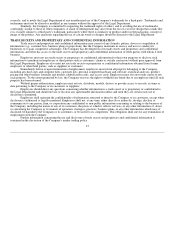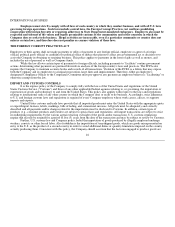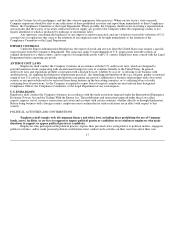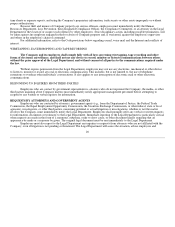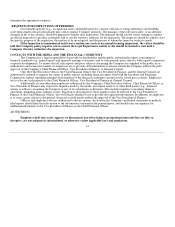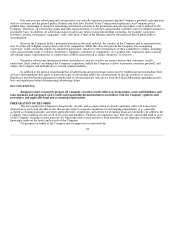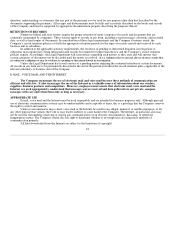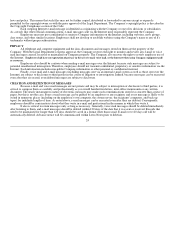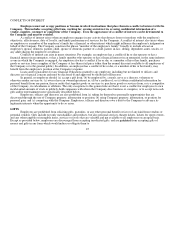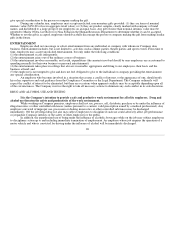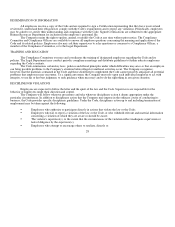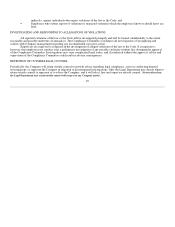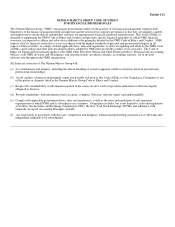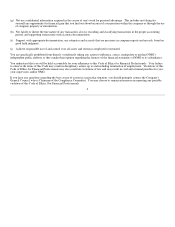Neiman Marcus 2002 Annual Report Download - page 162
Download and view the complete annual report
Please find page 162 of the 2002 Neiman Marcus annual report below. You can navigate through the pages in the report by either clicking on the pages listed below, or by using the keyword search tool below to find specific information within the annual report.
CONFLICTS OF INTEREST
Employees must not occupy positions or become involved in situations that place them in a conflict of interest with the
Company. This includes accepting gifts from, working for, owning an interest in, or using confidential information of a
vendor, supplier, customer or competitor of the Company. Even the appearance of a conflict of interest can be detrimental to
the Company and must be avoided.
A conflict of interest arises when an employee engages in any activity that detracts from or interferes with the employee's
objectivity, effectiveness, duty of loyalty, and timely performance of services for the Company. A conflict of interest also arises when
an employee or a member of the employee's family has a financial or other interest which might influence the employee's judgment on
behalf of the Company. The Company construes the phrase "member of the employee's family" broadly to include at least an
employee's spouse, domestic partner, child, spouse or domestic partner of a child, parent, in-law, sibling, dependent, aunts, uncles, or
any adult sharing the employee's residence.
Conflicts of interest can arise in many situations. For example, an employee has a conflict if he or she operates or has a
financial interest in an enterprise, or has a family member who operates or has a financial interest in an enterprise, in the same industry
as one in which the Company is engaged. An employee also has a conflict if he or she, or a member of his or her family, purchases
goods or services from a supplier of the Company at less than retail price (other than the normal discount available to all employees of
the Company or to the general public). In addition, an employee has a conflict if he or she, or a member of his or her family, may
benefit from the employee's position at the Company's expense.
Loans and/or guarantees for any financial obligations granted to any employee, including but not limited to officers and
directors are of special concern and must be disclosed to and approved by the Board of Directors.
In general, no employee should: (a) accept a gift from; (b) be employed by, consult, serve as a director, volunteer or
otherwise render services to; (c) own or have an ownership interest in; (d) be a creditor of; or (e) obtain confidential information for
personal benefit from any person, firm or entity that supplies goods or services to, purchases goods or services from, or is a competitor
of the Company, its subsidiaries or affiliates. The only exceptions to this general rule are that it is not a conflict for employees to own
insubstantial amounts of stock in publicly-held companies with whom the Company does business or competes, or to accept non-cash
gifts and/or entertainment more specifically described below.
Employees, officers and directors are also prohibited from (a) taking for themselves personally opportunities that are
discovered through the use of Company property, information or position; (b) using Company property, information, or position for
personal gain; and (c) competing with the Company. Employees, officers and directors owe a duty to the Company to advance its
legitimate interests when the opportunity to do so arises.
GIFTS Employees are prohibited from soliciting gifts, gratuities, or any other personal benefit or favor of any kind from vendors or
potential vendors. Gifts include not only merchandise and products, but also personal services, theater tickets, tickets for sports events,
and any other tangible or intangible items, services or favors that are valuable and not available to all employees on an equal basis.
Except as provided below, employees are discouraged from accepting unsolicited gifts, and are prohibited from accepting gifts of
money and gifts in any form which would induce or obligate them to
25


